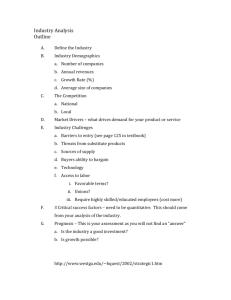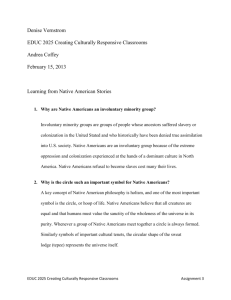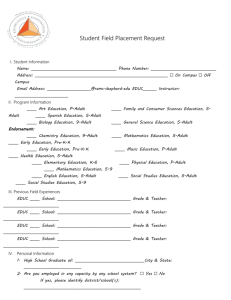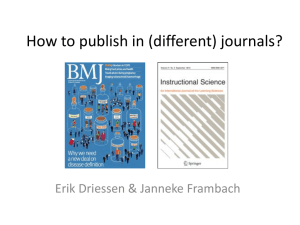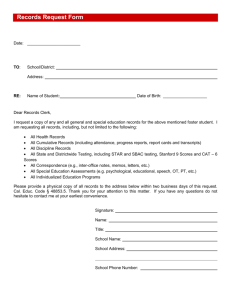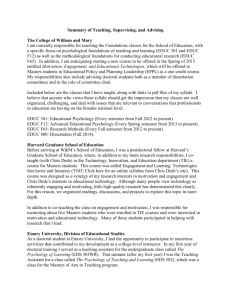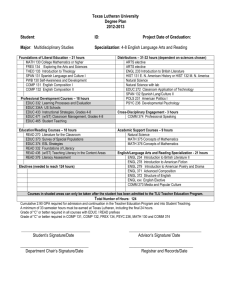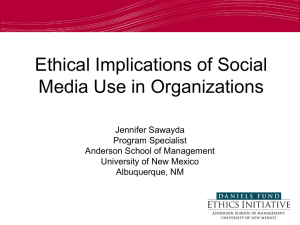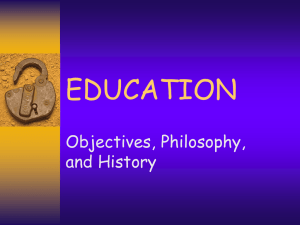EDUC 2120-06D - The University of West Georgia
advertisement
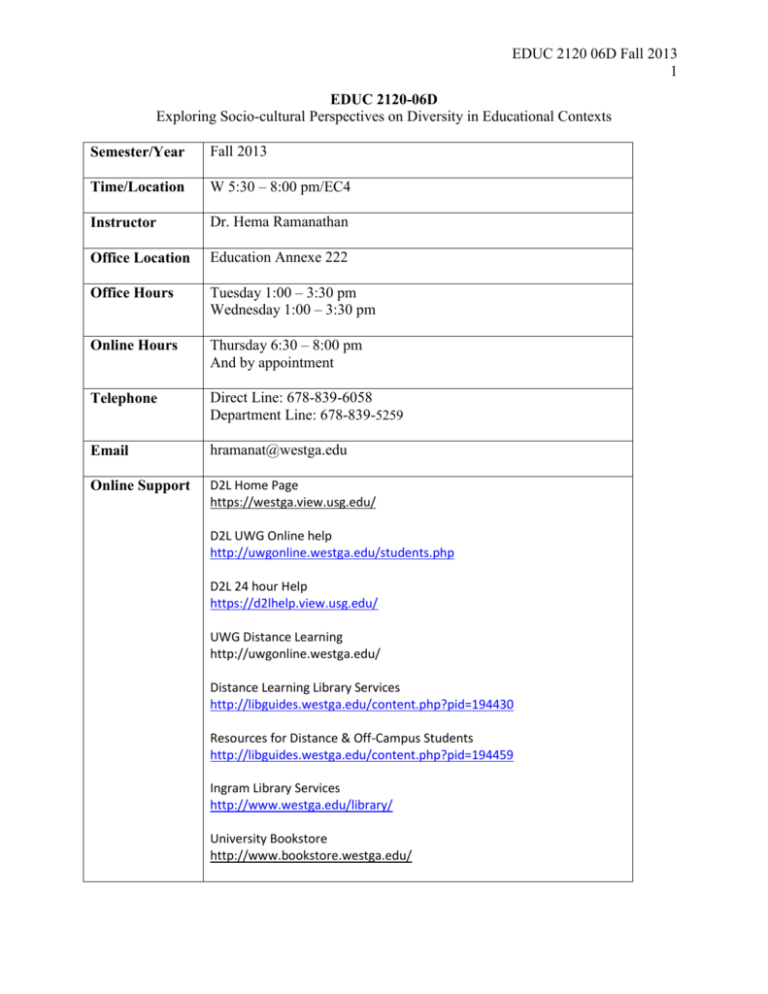
EDUC 2120 06D Fall 2013 1 EDUC 2120-06D Exploring Socio-cultural Perspectives on Diversity in Educational Contexts Semester/Year Fall 2013 Time/Location W 5:30 – 8:00 pm/EC4 Instructor Dr. Hema Ramanathan Office Location Education Annexe 222 Office Hours Tuesday 1:00 – 3:30 pm Wednesday 1:00 – 3:30 pm Online Hours Thursday 6:30 – 8:00 pm And by appointment Telephone Direct Line: 678-839-6058 Department Line: 678-839-5259 Email hramanat@westga.edu Online Support D2L Home Page https://westga.view.usg.edu/ D2L UWG Online help http://uwgonline.westga.edu/students.php D2L 24 hour Help https://d2lhelp.view.usg.edu/ UWG Distance Learning http://uwgonline.westga.edu/ Distance Learning Library Services http://libguides.westga.edu/content.php?pid=194430 Resources for Distance & Off-Campus Students http://libguides.westga.edu/content.php?pid=194459 Ingram Library Services http://www.westga.edu/library/ University Bookstore http://www.bookstore.westga.edu/ EDUC 2120 06D Fall 2013 2 COURSE DESCRIPTION This course is designed to equip future teachers with the fundamental knowledge of understanding culture and teaching children from diverse backgrounds. A field component totaling 10 hours is required. CONCEPTUAL FRAMEWORK The conceptual framework of the College of Education at UWG forms the basis on which programs, courses, experiences, and outcomes are created. With the goal of Preparing Exemplary Practitioners, our programs incorporate ten descriptors (knowledgeable, reflective, inquisitive, decisive, adaptive, proactive, leading, collaborative, culturally sensitive, empathetic), clustered into three interrelated and overlapping themes, that demonstrate our commitment to (a) Professional Excellence;(b) Field-Based Inquiry; and (c) the Betterment of Society. These themes and descriptors are integral components of the conceptual framework and provide the basis for developing exemplary practitioners who are prepared to improve schools and communities. National (INTASC) and state standards also are incorporated as criteria against which candidates are measured. The mission of the College of Education is to provide excellence in the initial and advanced preparation of professionals for a variety of settings, to foster an innovative learning community, and to empower a faculty committed to teaching and the dissemination of knowledge. This course’s objectives, activities, and assignments are related directly to the conceptual framework and national standards, as identified below. APPROACHES TO INSTRUCTION The following pedagogical methods you will be drawn upon for this class: interactive technology, guest speakers, small and large group discussions, extended reading, lecture and writing. This course will be delivered approximately 27% online. This requires the online equivalent of 600 minutes of instruction and an additional 1200 minutes of supporting activities. As such, you will be required to complete the following online activities during this course: Activity Discussion posts Audio/video instruction Instructional Equivalent 1500 minutes 300 minutes COURSE OBJECTIVES Students will: 1. examine the nature and function of culture (Delpit, 1998; Eaker-Rich & VanGalen, 1996; Irvine, 1997; Pang, 1998; Smith, 1998; Spring, 2004); EDUC 2120 06D Fall 2013 3 (Culturally Sensitive, Empathetic, Knowledgeable; INTASC 3, 5, 10) 2. explore how history and culture shape world views (Cushner, McClelland & Stafford, 2003; Eaker-Rich & VanGalen, 1996; Hale-Baneson, 1986; Kleinfield & Yerian, 1995; McLaughlin, 1992; Pang, 1998); (Lifelong Learners, Adaptive, Culturally Sensitive, Empathetic, Knowledgeable, Reflective; INTASC 1, 3, 5) 3. examine the development of his/her own cultural identity and learning styles (Bennett, Bridglall, Cauce, Everson, Gordon, Lee, Mendoza-Denton, Renzulli, & Stewart, 2004; Bernard, 1996; Diamond & Moore, 1995; Cushner, McClelland & Stafford, 2003; Haberman, 1995; Hollins, King, & Hayman, 1994; Kleinfield & Yerian, 1995; LadsonBillings, 1994; McLaughlin, 1992; Oakes, 1985; Pang, 1998; Sadker & Sadker, 1994; Slavin & Bradock, 1994; Spring, 2004; Wainer, 2004, Wood, 2006); (Lifelong Learners, Adaptive, Culturally Sensitive, Empathetic, Knowledgeable, Reflective; INTASC 1, 3, 5) 4. develop and apply strategies for observing, analyzing, and comparing differences related to family structures, socioeconomic status, abilities/disabilities and culture (Au, 1993; Banks & Banks, 2001; Gollnick & Chinn, 2002; Hernandez, 2001); (Decision Makers, Leaders, Adaptive, Collaborative, Culturally Sensitive, Empathetic, Knowledgeable, Proactive; INTASC 3, 9, 10) 5. articulate strategies for teaching culturally diverse students in the classroom (Au, 1993; Banks & Banks, 2001; Gollnick & Chinn, 2002; Hernandez, 2001); (Decision Makers, Leaders, Adaptive, Collaborative, Culturally Sensitive, Empathetic, Knowledgeable, Proactive; INTASC 1, 2, 3, 4) 6. identify school practices and policies that perpetuate and maintain achievement gaps, including negative stereotypes, related to race, class, persons with disabilities, gender, sexual orientation, and other forms of prejudice and discrimination (Au, 1993; Banks & Banks, 2001; Campbell, 2000; Gollnick & Chinn, 2002; Hernandez, 2001); (Decision Makers, Leaders, Adaptive, Collaborative, Culturally Sensitive, Empathetic, Knowledgeable, Proactive; INTASC 9, 10) 7. identify educators’ cultural practices and expectations that perpetuate and maintain achievement gaps (Au, 1993; Bennett, Bridglall, Cauce, Everson, Gordon, Lee, MendozaDenton, Renzulli, & Stewart, 2004; Bernard, 1996; Delpit, 1998; Diamond & Moore, 1995; Eaker-Rich & VanGalen, 1996; Cushner, McClelland & Stafford, 2003; Hale-Baneson, 1986; Hollins, King & Hayman, 1994; Irvine, 1997; Johnson & Roen, 1989; Kleinfield & Yerian, 1995; McLaughlin, 1992; Oakes, 1985; Pang, 1998; Purcell-Gates, 1995; Sadker & Sadker, 1994; Slavin & Bradock, 1994; Tatum, 1997; Wainer, 2004; Wood, 2006); (Decision Makers, Leaders, Adaptive, Collaborative, Culturally Sensitive, Empathetic, Knowledgeable, Proactive; INTASC 1, 3, 5) 8. identify strategies that creatively deal with challenges and differences between the cultures of educators and students (Au, 1993; Banks & Banks, 2001; Gollnick & Chinn, 2002; EDUC 2120 06D Fall 2013 4 Hernandez, 2001); and (Decision Makers, Leaders, Adaptive, Collaborative, Culturally Sensitive, Empathetic, Knowledgeable, Proactive; INTASC 1, 3, 5) 9. identify assets and values of diverse populations to bring student learning to higher levels (Au, 1993; Bennett, Bridglall, Cauce, Everson, Gordon, Lee, Mendoza-Denton, Renzulli, & Stewart, 2004; Bernard, 1996; Delpit, 1998; Diamond & Moore, 1995; Eaker-Rich & VanGalen, 1996; Cushner, McClelland & Stafford, 2003; Hale-Baneson, 1986; Hollins, King & Hayman, 1994; Irvine, 1997; Johnson & Roen, 1989; Kleinfield & Yerian, 1995; McLaughlin, 1992; Oakes, 1985; Pang, 1998; Purcell-Gates, 1995; Sadker & Sadker, 1994; Slavin & Bradock, 1994; Tatum, 1997; Wainer, 2004; Wood, 2006). (Decision Makers, Leaders, Adaptive, Collaborative, Culturally Sensitive, Empathetic, Knowledgeable, Proactive; INTASC 1, 2, 7) TEXTS, READINGS, INSTRUCTIONAL RESOURCES, AND REFERENCES Required Text(s) None. References Au, K. H. (1993). Literacy instruction in multicultural settings. New York: Harcourt Brace. Banks, J., & Banks, C. A. M. (2001). Multicultural education: Issues and perspectives (4th ed.). New York: John Wiley. Bennett, A., Bridglall, B. L., Cauce, A. M., Everson, H. T., Gordon, E. W., Lee, C. D., MendozaDenton, R., Renzulli, J. S., & Stewart, J. K. (2004). All students reaching the top: Strategies for closing academic achievement gaps. A Report of the National Study Group for the Affirmative Development of Academic Ability. Naperville, IL: North Central Regional Educational Laboratory. Blumenfeld, W. J., Joshi, K. Y. and Fairchild, E. E. (2008). Investigating Christian privilege and religious oppression in the United States. Sense Publishers Campbell, D. E. (2000). Choosing democracy: A practical guide to multicultural education. Columbus, OH: Merrill/ Prentice Hall. Cary, S. (2007). Working with second language learners: Answers to teachers’ top ten questions, 2nd edition. Portsmouth, NH: Heinemann Cushner, K., McClelland, A., & Safford, P. (2003). Human diversity in education: An integrative approach. New York: McGraw-Hill. Delpit, L. (1998). The silenced dialogue: Power and pedagogy in educating other people’s children. Harvard Educational Review, 58, 280-298. Diamond, B., & Moore, M. (1995). Multicultural literacy: Mirroring the reality of the classroom. New York: Longman. Eaker-Rich, D., & Van Galen, J. (Ed.). (1996). Caring in an unjust world: Negotiating borders and barriers in school. Albany: State University of New York Press. Haberman, M. (1995). Star teachers for children of poverty. West Lafayette, IN: Kappa Delta Pi. Hale-Baneson, J. (1986). Black children: Their roots, culture, and learning (Rev. ed.). Baltimore: John Hopkins University Press. Hernandez, H. (2001). Multicultural education: A teacher's guide to linking context, process, and content. Columbus, OH: Merrill/Prentice Hall. EDUC 2120 06D Fall 2013 5 Irvine, J. J. (2003). Educating teachers for diversity: Seeing with a cultural eye. New York: Teachers College Press. Irvine, J. J. (Ed.). (1997). Critical knowledge for diverse teachers and learners. Washington, D.C.: AACTE. Kleinfield, J., & Yerian, S. (Eds.). (1995). Gender tales: Tensions in the schools. New York: St. Martins Press. Ladson-Billings, G. (1994). Dreamkeepers: Successful teachers of African American children. San Francisco, CA: Jossey-Bass. Lindsey, D. (2008). Child poverty and inequality: Securing a better future for America's children. Oxford University Press No Child Left Behind Act of 2001, Pub. L. No. 107-110, 115 Stat. 1425 (2002). Oakes, J. (1985). Keeping track: How schools structure inequality. New Haven, CT: Yale University Press. Purcell-Gates, V. (1995). Other people’s words: The cycle of low literacy. Cambridge, MA: Cambridge University Press. Sadker, M., & Sadker, D. (1994). Failing at fairness: How our schools cheat girls. New York: Simon & Schuster. Slavin, R. E., & Bradock, J., III., (1994). Ability grouping: On the wrong track. In J. I. Goodlad & P. Keating (Eds.), Access to knowledge: The continuing agenda for our nation’s schools. New York: College Entrance Examination Board. Sleeter, C. E., & Grant, C. A. (1999). Making choice for multicultural education: Five approaches to race, class, and gender. Columbus, OH: Merrill/Prentice Hall. Smith, G. P. (1998). Common sense about uncommon knowledge: The knowledge bases for diversity. Washington, DC: AACTE. Spring, J. (2004). The intersection of cultures. New York: McGraw Hill. Suarez-Orozco, C. and Suarez-Orozco, M. M. (2002). Children of immigration. Cambridge, Mass: Harvard University Press. Tatum, B. D. (1997). Why are all the Black kids sitting together in the cafeteria? And other conversations about race. New York: Basic Books. Villegas, A. M., & Lucas, T. (2002). Educating culturally responsive teachers: A coherent approach. Albany: State University of New York. Wainer, A. (2004). The new Latino south: Strategies for educators and policy makers in emerging immigrant communities. Los Angeles: The Tomas Rivera Policy Institute. Wood, J. W. (2006). Teaching students in inclusive settings (5th ed.). Columbus, OH: Merrill/Prentice Hall. Zinn, H. (2001). A people’s history of the United States: 1492-present (1st ed.). New York, NY: Harper Collins. ASSIGNMENTS, EVALUATION PROCEDURES, AND GRADING Assignment 1: Role of Resource Person (2x10) Sign up for two sessions. Purpose: To provide one article to your group, in addition to the readings provided by the instructor. The article should be on the topic of the week as listed in the syllabus. It should be published after 2008, not more than five years old. This article should be from an academic journal found on the Ingram library website. EDUC 2120 06D Fall 2013 6 It may not be from a popular magazine or a newspaper. Provide the following details of the article using this format: Author name. (Date). Title of article, Journal name, volume, issue. Provide the link to the article. You may not re-post the entire article since that is illegal. Due date: Monday of the week of the class. If as a reader the link does not work for you, use the bibliographical details to search for the article on the library website. Assignment 2: Cultural Autobiography (50 pts.) Your cultural autobiography should be a two to three page paper that shares information about your heritage, your values and beliefs, your interactions with others who are not like you (in terms of race, ethnicity, socioeconomic status, abilities, sexuality, language, or religion). Think about such things as how your family celebrates important occasions, what activities are valued, what is important to you, what you think of when you think of ‘home’ (such as barbequing together, Sunday dinner, listening to someone sing a certain song, smelling a certain aroma). I want to know about you and your cultural background. Culture includes language, beliefs, values, family stories, how you were taught to live your life, how you were socialized, what you were taught is ‘right’. You do not have to share any information that you do not want made public. Post your cultural autobiography online in the Dropbox. (Course Objectives 1 and 3) Assignment 3: Stereotypes in the Media (100) points) 1 Purpose: To document how various stereotypes are evident or unfairly represent (or misrepresent) individuals or groups in various media formats. 2 Artifacts: Collect a minimum of 10 different examples of how cultural attributes are miscommunicated or unfairly represented. Search out artifacts in which such misrepresentation is not obvious but is implied or is covert or is assumed. 3 At least 6 different groups must be represented in your artifacts. No group can be featured in more than two artifacts. So pick your artifacts carefully to demonstrate the stereotype you think is most unfair to the group. 4 Use examples from popular media such as TV, newspapers and magazines. You may also use song lyrics, video games, internet material, greeting cards, match covers, classroom resources, activities and incentives for students, etc. 5 Use a camera to photograph billboards, displays etc. Radio and TV material may be included as excerpts with appropriate references of date, title of program and time of airing. Scan articles neatly. 6 Captions for each slide: Explain in no more than 50 words what misrepresentations or stereotypes you see in each artifact. State the group that is being stereotyped (e.g. Asian Americans); State what aspect is being stereotyped (e.g. All Asian Americans are said to be clever, intelligent and successful). Refuting the Stereotype: Explain briefly why you think the stereotype is not appropriate. (Your opinion that this is not correct or fair carries no weight!) Quote facts, statistics and sources where possible to support your contention (e.g. Of Cambodians, Hmong, and Laotians, 22% live in poverty and 10% receive public EDUC 2120 06D Fall 2013 7 assistance, the highest of any group, including Native Americans - http://www.asiannation.org/demographics.shtml). 7 The PowerPoint must be submitted on CourseDen in the appropriate Week in the forum Stereotypes-Artifacts. The subject line should read <Your Name>. If your file happens to be too large and will not upload easily, zip the file to decrease its size. Please note that this will be part of your Readings for the week. 8 You will need to read all the submissions of your group members. 9 Post three responses in the forum Stereotypes-Postings. Mention the group members by name when you comment on their artifacts. 10 Each response must be substantive in thought and content, and about 150 – 200 words. Comment on what you have learnt from your group members’ artifacts. For example, suggest facts that refute the stereotype presented; point out another stereotype suggested by an artifact that has not highlighted. (Responses of I really liked your artifacts do not count.) (Course Objectives 1-4) Assignment 4: Online Discussion (9x30 pts.) By Week 2, you will be assigned to a group of 6-8 members. Task 2: Reading Articles 1. By Monday of each week you will read all the presentation material for the week found in the forum titled Readings and the assigned chapters. 2. You will submit a minimum of three postings for each online session as detailed below. Task 2: Initial Posting 3. Make a contribution to this dialogue by posting your own comments on and reactions to the assigned readings on the Discussion Board in the appropriate week's forum. This posting should indicate what you learned from the readings, and how you think this information will help you become a better teacher. 4. Please indicate postings with <Initial Posting-Your Name> in the Subject line for easy identification. 5. The initial postings may be about 200-250 words and should be posted by Wednesday 8:00 pm. 6. Remember that without your posts, your group members will not have anything to respond to. What you do affects the others and their grade. Be responsible, be considerate. Task 3: Follow up Postings 7. Between Wednesday and Friday of the week, read the initial postings of all the members of your group. You must respond thoughtfully and constructively to at least two of these initial posts in two separate postings. (Comments such as Good job! and Nice work! do not count!). You may respond as a Reply to the initial posting or post it separately with <Response to XXX> in the Subject line for easy identification. 8. The follow up postings will vary in length averaging about 150 words each and must be posted by Saturday 5:00 pm. EDUC 2120 06D Fall 2013 8 Check the Calendar on D2L for deadlines to help you stay on track. Notes: 1. This is professional work. Please spell check your work posting it. 2. Participating in an online class requires you to have the same attitudes and values to learning and your peers that an f2f setting does. In an f2f class, you would be expected to speak up, listen to what others have something to say, and respond to their comments both verbally and non-verbally. 3. In this online class, this takes the form of posting an initial posting; reading everyone's posting, and responding to them to continue the conversation. Since body-language is necessarily absent, frequent posting of a shorter length can serve that purpose (though these will not be graded). So please ensure that you read all postings by the end of the week; respond to the postings; and make everyone feel they have been heard and responded to. (Course Objectives 1-9) Assignment 5: Field Placement Project (100 pts.) Option A: Teachers in India Ten hours of outreach are required for the completion of this course. Calorx Teachers University (CTU) is in Ahmedabad, India, and the students, who like you are being educated to be teachers, are from a very low socio-economic status. You will interact with the students from CTU on emails, skype and other distance education means. Purpose: The purpose is for you to better understand how prospective teachers from India, especially from a disadvantaged community, view diversity in their lives and in India, how these views have affected their lives as students and as people, and will influence their work as teachers and as students. Process: You will be paired with one or two students from CTU. For a period of 5 weeks between September and November), you will write 2 e-mails a week, one originating from you, another as a response to the e-mail from your partner at CTU. Each e-mail should be about 100 – 150 words in length and the content should relate to an aspect of diversity (ethnicity, gender, socio-economic status, etc.). You may explain the US perspective on each aspect and ask specific questions about the Indian context. You will Skype with them at least once in the course of this interaction. Paper: Your final submission for this project will consist of the following: A compilation of the e-mail exchanges datewise from the earliest to the latest. A 100 word summary of the Skype session. A 500-word analysis of your learning from and response to the project. (Course Objectives 1, 2, 3, 7 & 9) Option B: Ten hours of outreach are required for the completion of this course. For this assignment, you will engage in an activity that exposes you to some aspect of diversity with which you are not EDUC 2120 06D Fall 2013 9 familiar, and in which you observe children. All learning is risk-taking. So be adventurous, be brave. 1. Seek out an entirely new environment. Sample activities are: attending a Native American powwow, visiting a nursing home, volunteering at a soup kitchen or homeless shelter, tutoring in an after school program, volunteering at the Boys/Girls Club or YMCA, helping with a scout meeting, attending a cultural festival, attending a religious service of a church with which you are not familiar, hanging out at a gay bar. As you engage in the activity, think about these questions: What have I learned about diversity? What does this mean to me as a future teacher? How will this information help me meet my students’ needs? What does this mean for me in planning my curriculum? How does what you learned relate to your own experience? What should others know about the topic? 2. Write a 350-word/one-page reflection, sharing your experience of engaging in this activity and what you learned about diversity. Use the following section headings in your paper: Summary of the activity What I learned How this learning will help me meet the individual needs of students. (Course Objectives 5, 6, 8, and 9) Assignment 6: A Day Without English (60 pts.) The purpose of this is to understand being the “other.” Instructions will be in due course (Course Objectives 1, 3 & 4-9) Assignment 7: Final Exam (50 pts.) Your final exam is a one-page paper on you as a life-long learner. More specific instructions will be posted two weeks before the assignment is due. Note: All assignments that are to be graded should be posted on CourseDen in the appropriate forum, which the titles will make clear. A University of West Georgia graduate should be able to demonstrate the ability to interpret and integrate information and the ability to express thoughts coherently in oral and in written form. This is especially true for educators. Therefore, all work and postings should be proofread for standard English grammar, spelling, capitalization, punctuation, and proper citations according to APA (6th) guidelines (not MLA). Written work must be completed in a typed, double-space format, with Times/Times New Roman font, size 12, and 1-inch margins on all sides unless otherwise indicated. Assignments will be lowered by 50% if the aforementioned are not followed. Late work will not be accepted and will result in a grade of a zero for the assignment. Evaluation Procedures EDUC 2120 06D Fall 2013 10 Assignment Resource Person Cultural Autobiography Stereotypes in the Media Online Discussion (9x30) Points 20 50 100 270 Assessment Tools Numeric Rubric Rubric Rubric Field Experience Project A Day Without English Final Exam Total 100 60 50 Rubric Rubric Rubric Due Dates Weeks signed up for Sept. 4 October 9 Sept.4,18, 25, Oct.9, 23, 30 & Nov. 13, 20 and Dec. 4 Nov. 20 December 4 Dec. 11 Grading A = 650 to 585 points B = 584 to 520 points C = 519 to 455 points D = 454 to 390 points F = 389 and below CLASS, DEPARTMENT, AND UNIVERSITY POLICIES CLASS, DEPARTMENT, AND UNIVERSITY POLICIES Please carefully review the information at Common Language for Course Syllabi at http://www.westga.edu/assetsDept/vpaa/Common_Language_for_Course_Syllabi.pdf. It contains important information related to your rights and responsibilities in this class. Because these statements are updated as federal, state, university, and accreditation standards change, you should review the information each semester. In addition to the above information the following policies apply to this course. Original Work: Assignments completed for another class, including field observation hours, may not be used to fulfill the requirements for this class. All work completed in this course must be original work developed during this semester. Attendance: Your attendance is required for this class to be a successful learning experience. Extra Credit: There are no extra credit opportunities in this class. Late Work: Late work will not be accepted. Note the due date and time the work is due for each assignment. All assignments will be submitted through CourseDen. The window for submission automatically closes at the assigned hour. Professional Conduct: This course addresses issues of diversity, which requires that we all remember to gauge our language and responses to ensure that we are properly respectful of each other. EDUC 2120 06D Fall 2013 11 Student Email Policy: University of West Georgia students in partial online courses are provided with Course Den email. This will be the official means of communication between the University and student for this course. It is the student’s responsibility to check this email account for important course related information. Our primary means of communication will be through CourseDen. If you fail an EDUC course, you cannot retake the course from the same instructor. You must repeat the course with a different instructor, according to EDUC policy. If you want to retake a course to improve your grade, you must gain the permission of the instructor first. Many instructors will want you to repeat the course with a different instructor. Because field observation is a certification requirement rather than a course assignment, failure to provide documentation that 10 hours of field observation have been completed will result in a grade of F for the course. CLASS OUTLINE Date Aug. 28 Sept. 4 (Online) Sept. 11 Sept. 18 (Online) Assignments due Sept. 25 (Online) Oct. 2 Class Activities/Topics Identity Building School Climate Race and Ethnicity Asian Americans & Native Americans African Americans Latino/a Oct. 9 (Online) Oct. 16 Oct. 23 (Online) Oct. 30 (Online) Nov. 6 Nov. 13 (Online) Nov. 20 (Online) Nov. 27 Stereotypes Gender Socio-economic status Exceptionality Sexual orientation Religion Language Thanksgiving Break – No Class Stereotypes in the Media Dec. 4 (Online) Dec. 11 Teachers and Advocacy A Day Without English Final Exam Cultural Autobiography Field Placement Project
